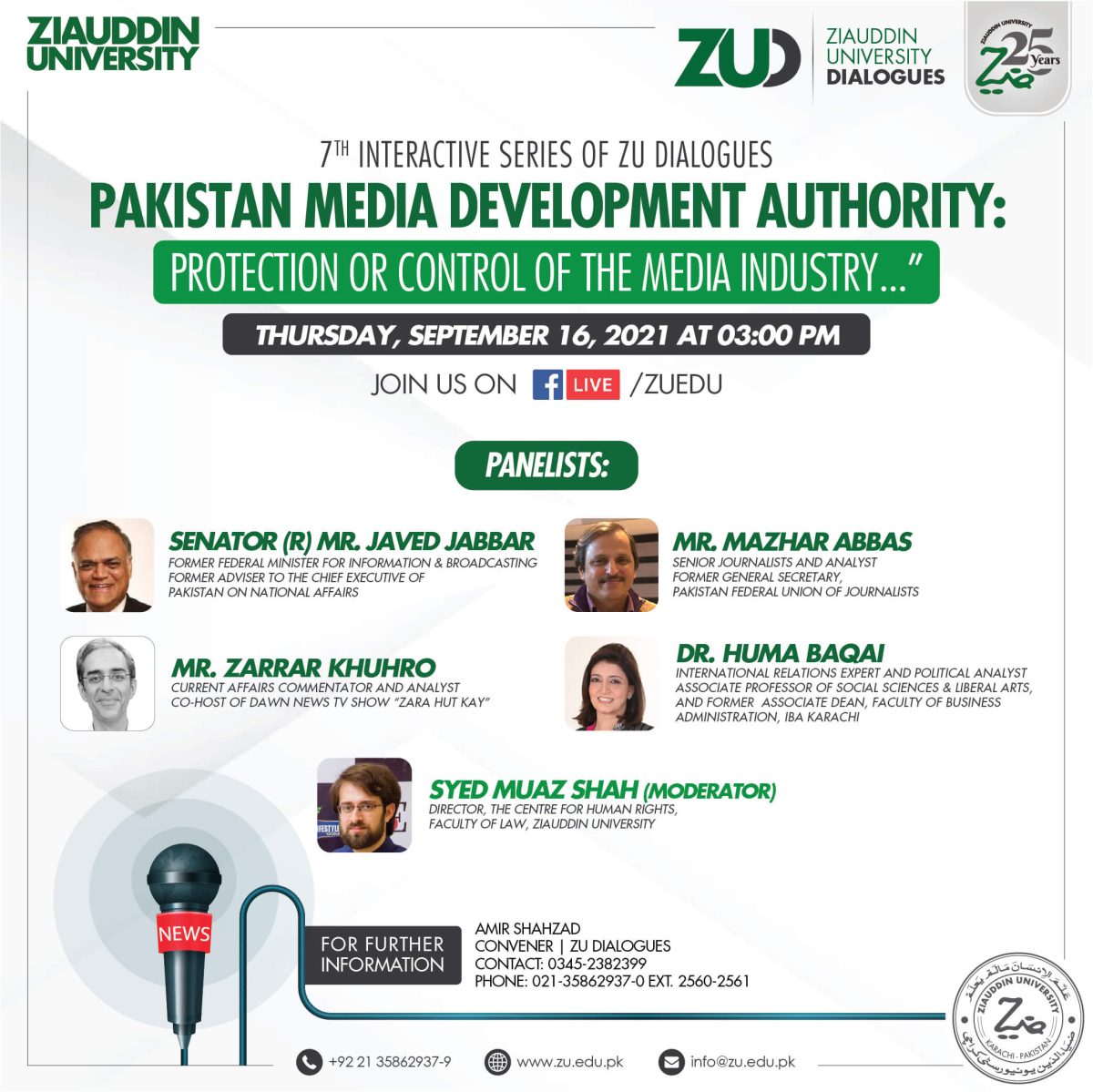[vc_row][vc_column][vc_column_text]
Ziauddin University presents 7th interactive series of “ZU Dialogues”
“Pakistan Media Development Authority: Protection or control of the media industry”
Ziauddin University organized the 7th interactive series of “ZU Dialogues”, titled “Pakistan Media Development Authority: Protection or control of the media industry”.
The aim behind this online dialogue session was to get opinions and analysis of the experts about the Pakistan Media Development Authority (PMDA) which has been described in the ordinance as “an independent, efficient, effective and transparent” authority which will regulate all forms of media, including digital media.
The ZU Dialogue was attended by Senator (R) Mr. Javed Jabbar, Former Federal Minister for Information & Broadcasting; Mr. Mazhar Abbas, Senior Journalists and Analyst; Mr. Zarrar Khuhro, Current Affairs Commentator and Analyst; Dr. Huma Baqai, International Relations Expert and Political Analyst; and moderated by Syed Muaz Shah, Director, The Center for Human Rights, Faculty of Law, Ziauddin University.
Former senator and information minister Javed Jabbar said the subject under discussion was currently the centre of attention.
“We have a convergence between the political opposition and all segments of the media. Ironically, there are truths on both sides of the controversy. There is truth in what the government is doing. Never before in human history have the content of all media come together into a single medium, which is the smartphone. Side by side, you have the content of print, radio, cinema, TV, social media … all broiling and churning a single medium.
“What happens within that, you have authentic, reliable journalism. You also have quasi-journalism, and you have outright disinformation and fake news. This has never happened before. How do you deal with it? It’s a global dilemma. [Pakistani] government shares the same dilemma with the US and China. In the US, Twitter had to ban president Donald Trump because he’s creating falsehoods. On the other hand, China refuses to allow platforms such as Google and Facebook.”
Mr Jabbar said where he empathises with journalists is vis-à-vis the fact that in the past 20 years about 70 journalists have tragically lost their lives to unnatural and violent ways. And no one has been found and punished. Some journalists have been deprived of their jobs, too. “But it is also true that media in Pakistan have very high levels of freedom of expression.”
He argued that the only way forward is to have a dialogue. And we need to have with regard to the media the following three aspects: self-regulation, social regulation and state regulation.
Journalist Mazhar Abbas said, “If you go through the statement of the speaker of the National Assembly regarding who ordered the staff to lock the press gallery [you’ll notice that] the speaker said he ordered
the staff after consultation with the parliamentary reporters. The Parliamentary Reporters Association said there was no dialogue, categorically denying that they were consulted by the speaker.”
Mr Abbas then talked about the definition of fake news that’s being extensively discussed. He concluded his remarks by saying that if the PMDA is established it will be a disaster for critical voices.
Journalist Zarrar Khuhro said he’d like to give credit to the government. “They have certainly built a consensus, and it is a 100 per cent against the PMDA. That is a rare achievement. It seems where [government] needs a scalpel they use a hammer, and where they need a hammer, they use a bulldozer. When you start doing something in this manner, you may have the greatest law, [but] I’m not going to believe you, simply because of the way you’re doing it.
“They talk about fake news as if it’s some kind of an epidemic in Pakistan. I assure you it is not. The number one source of fake news in Pakistan is the government. What was 35 punctures? Shehbaz Sharif has taken millions of dollars in commission from a Chinese company? Then you have the aviation minister blatantly speaking falsehoods in the National Assembly, etc.”
Political analyst Dr Huma Baqai said when she worked for PTV during Gen Musharraf’s tenure she never received any phone call from Islamabad or PM House. She also worked with the PPP and Nawaz Sharif and oftentimes they shut down her programme. “I don’t think distinctions such as these are ‘democratic norms’ and these are ‘military norms’ exist with the way the media function today. The time that we are living in is called the post-truth construct. It entered the dictionaries in 2016 but much before that it was politically clichéd.
“The people who take high moral ground that they’re working for private media and they’re independent, no one is independent. They cater to the needs of commodification, they cater to the needs of commercialisation.
—END—
Amir Shahzad
[/vc_column_text][vc_single_image image=”11192″ img_size=”full”][/vc_column][/vc_row]


